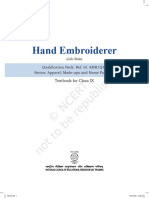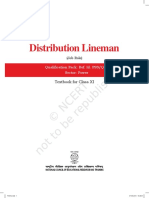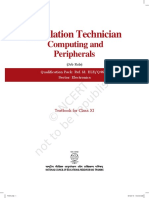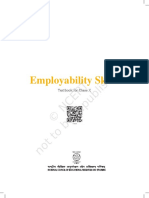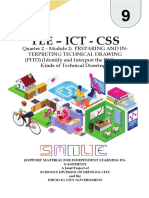Ieeo1ps PDF
Ieeo1ps PDF
Uploaded by
Shamim AkhtarCopyright:
Available Formats
Ieeo1ps PDF
Ieeo1ps PDF
Uploaded by
Shamim AkhtarOriginal Title
Copyright
Available Formats
Share this document
Did you find this document useful?
Is this content inappropriate?
Copyright:
Available Formats
Ieeo1ps PDF
Ieeo1ps PDF
Uploaded by
Shamim AkhtarCopyright:
Available Formats
Domestic Data
Entry Operator
(Job Role)
Qualification Pack: Ref. Id. SSC/Q2212
Sector: Information Technology and Information
Technology enabled Services (IT–ITeS)
Textbook for Class IX
Prelims.indd 1 9/26/2018 10:13:03 AM
ISBN 978-93-5292-095-2
First Edition ALL RIGHTS RESERVED
September 2018 Bhadrapada 1940 No part of this publication may be reproduced, stored in a
retrieval system or transmitted, in any form or by any means,
electronic, mechanical, photocopying, recording or otherwise
without the prior permission of the publisher.
PD 5T BS This book is sold subject to the condition that it shall not,
by way of trade, be lent, re-sold, hired out or otherwise
disposed off without the publisher’s consent, in any form of
© National Council of Educational binding or cover other than that in which it is published.
Research and Training, 2018 The correct price of this publication is the price printed on
this page. Any revised price indicated by a rubber stamp or
by a sticker or by any other means is incorrect and should
be unacceptable.
OFFICES OF THE PUBLICATION
DIVISION, NCERT
NCERT Campus
Sri Aurobindo Marg
New Delhi 110 016 Phone : 011-26562708
108, 100 Feet Road
Hosdakere Halli Extension
Banashankari III Stage
Bengaluru 560 085 Phone : 080-26725740
Navjivan Trust Building
P.O. Navjivan
Ahmedabad 380 014 Phone : 079-27541446
165.00 CWC Campus
Opp. Dhankal Bus Stop
Panihati
Kolkata 700 114 Phone : 033-25530454
CWC Complex
Maligaon
Guwahati 781 021 Phone : 0361-2674869
Publication Team
Head, Publication : M. Siraj Anwar
Division
Chief Editor : Shveta Uppal
Printed on 80 GSM paper with NCERT Chief Business Manager : Gautam Ganguly
watermark
Chief Production Officer : Arun Chitkara
Published at the Publication Division
by the Secretary, National Council of Editor : Bijnan Sutar
Educational Research and Training, Production Officer : Abdul Naim
Sri Aurobindo Marg, New Delhi 110 016
and printed at Laxmi Print India,
Cover and Layout
519/1/23, Sansar Compound, Dilshad
Garden Industrial Area, Shahdara, DTP Cell, Publication Division
Delhi -110 095
Prelims.indd 2 9/26/2018 10:13:03 AM
Foreword
The National Curriculum Framework–2005 (NCF–2005) recommends
bringing work and education into the domain of the curricular,
infusing it in all areas of learning while giving it an identity of its
own at relevant stages. It explains that work transforms knowledge
into experience and generates important personal and social values
such as self-reliance, creativity and cooperation. Through work one
learns to find one’s place in the society. It is an educational activity
with an inherent potential for inclusion. Therefore, an experience
of involvement in productive work in an educational setting will
make one appreciate the worth of social life and what is valued and
appreciated in society. Work involves interaction with material or
other people (mostly both), thus creating a deeper comprehension
and increased practical knowledge of natural substances and social
relationships.
Through work and education, school knowledge can be easily
linked to learners’ life outside the school. This also makes a departure
from the legacy of bookish learning and bridges the gap between
the school, home, community and the workplace. The NCF–2005
also emphasises on Vocational Education and Training (VET) for
all those children who wish to acquire additional skills and/or seek
livelihood through vocational education after either discontinuing
or completing their school education. VET is expected to provide a
‘preferred and dignified’ choice rather than a terminal or ‘last-resort’
option.
As a follow-up of this, NCERT has attempted to infuse work
across the subject areas and also contributed in the development
of the National Skill Qualification Framework (NSQF) for the
country, which was notified on 27 December 2013. It is a quality
assurance framework that organises all qualifications according
to levels of knowledge, skills and attitude. These levels, graded
from one to ten, are defined in terms of learning outcomes, which
Prelims.indd 3 9/26/2018 10:13:03 AM
the learner must possess regardless of whether they are obtained
through formal, non-formal or informal learning. The NSQF sets
common principles and guidelines for a nationally recognised
qualification system covering Schools, Vocational Education and
Training Institutions, Technical Education Institutions, Colleges
and Universities.
It is under this backdrop that Pandit Sunderlal Sharma Central
Institute of Vocational Education (PSSCIVE), Bhopal, a constituent
of NCERT has developed learning outcomes based modular
curricula for the vocational subjects from Classes IX to XII. This
has been developed under the Centrally Sponsored Scheme of
Vocationalisation of Secondary and Higher Secondary Education of
the Ministry of Human Resource Development.
This textbook has been developed as per the learning outcomes
based curriculum, keeping in view the National Occupational
Standards (NOS) for the job role and to promote experiential learning
related to the vocation. This will enable the students to acquire
necessary skills, knowledge and attitude.
I acknowledge the contribution of the development team, reviewers
and all the institutions and organisations, which have supported in
the development of this textbook.
NCERT would welcome suggestions from students, teachers and
parents, which would help us to further improve the quality of the
material in subsequent editions.
Hrushikesh Senapaty
Director
New Delhi National Council of Educational
June 2018 Research and Training
(iv)
Prelims.indd 4 9/26/2018 10:13:03 AM
About the Textbook
The IT–ITeS sector is growing at a fast pace and is a very important
industry in India and abroad. In the growing business opportunities
in various domains around the globe, there is a huge transfer of
information from one place to another. Large amount of data are
churned thus creating a need for proper management of the data
that are collected. The companies also have to concentrate on their
core activities and resort to outsourcing the data entry process. The
rapid growth in the IT industry along with the entry of many small
and large outsourcing companies in this area, has led to a huge
demand for trained personnel for various job roles, such as Data
Entry Operator.
Domestic Data Entry Operators in the IT-ITeS Industry are also
known as a Data Entry Operators. These individuals are responsible
for providing daily work reports and work on hourly basis. They
are also responsible for electronic entry of data from the client site
on to the office site or vice-versa. Individual tasks vary depending
on the size and structure of the organisation. This job requires the
individual to have thorough knowledge of various technology trends
and processes as well as have updated knowledge about database
management systems and IT initiatives. The individual should know
fast and accurate typing or data encoding. This job involves working
on a computer, and appropriate software to enter accurate data
regarding different issues like retrieving data from a computer or to
a computer.
The textbook for the job role of “Domestic Data Entry Operator”
has been developed to impart knowledge and skills through
hands‑on learning experience, which forms a part of the experiential
learning. Experiential learning focuses on the learning process for
the individual. Therefore, the learning activities are student-centered
rather than teacher-centered.
The textbook has been developed with the contribution of the
expertise from the subject and industry experts and academicians
Prelims.indd 5 9/26/2018 10:13:03 AM
for making it a useful and inspiring teaching-learning resource
material for the vocational students. Adequate care has been taken
to align the content of the textbook with the National Occupational
Standards (NOSs) for the job role so that the students acquire
necessary knowledge and skills as per the performance criteria
mentioned in the respective NOSs of the Qualification Pack (QP).
The textbook has been reviewed by experts so as to make sure that
the content is not only aligned with the NOSs, but is also of high
quality. The NOSs for the job role of Domestic Data Entry Operator
covered through this textbook are as follows:
1. SSC/N3022 – Undertaking data entry services
2. SSC/N9001 – Managing work to meet requirements
3. SSC/N9003 – Maintaining a healthy, safe and secure working
environment
Unit 1 of the textbook explains the various career opportunities
within the IT–ITeS sector. It then details the various IT enabled
services. Maintaining the work area as well as the health and safety
aspects within the IT service sector are also covered in the first
unit. Unit 2 will help students to learn typing skills using a typing
tutor. It also covers the ergonomics and sitting posture, to put the
student on a firm footing in terms of health aspects associated with
computer systems. Unit 3 deals with basic Word Processing skills
so that students can learn to enter and edit the text to prepare the
document. Unit 4 deals with basic spreadsheet skills to prepare
a worksheet so that students can learn to create and manipulate
the data in the spreadsheet. Unit 5 covers the basic presentation
skills to prepare a slide presentation so that students can learn
to create presentations.
Dipak D. Shudhalwar
Associate Professor (CSE) and Head
Department of Engineering and Technology
PSSCIVE, NCERT, Bhopal
(vi)
Prelims.indd 6 9/26/2018 10:13:03 AM
ACKNOWLEDGEMENT
The National Council of Educational Research and Training (NCERT)
expresses its gratitude to all members of the Project Approval Board
(PAB) and officials of the Ministry of Human Resource Development
(MHRD), Government of India, for their cooperation in the development
of this textbook. The Council also extends gratitude to all the
contributors for sharing their expertise and valuable time by positively
responding to the request for the development of this textbook.
The Council expresses it gratitude towards Rajesh Khambayat, Joint
Director, PSS Central Institute of Vocational Education (PSSCIVE),
Bhopal, for providing support and guidance in the development of
this textbook. We are thankful to the course coordinator Dipak D.
Shudhalwar, Associate Professor (CSE) and Head, Department of
Engineering and Technology, PSSCIVE, NCERT, Bhopal, for his
untiring efforts towards solely developing the content for this textbook
and also providing software related photographs used in the textbook.
The images used other than these are under Creative Commons
License. Ganesh Kumar Dixit and Jayant Mishra, Consultants in
IT–ITeS, Department of Engineering and Technology, PSSCIVE, Bhopal,
are also duly acnowledged for their untiring efforts and contribution in
the development of this textbook for vocational skills.
The Council is grateful to Saroj Yadav, Professor and Dean (A), NCERT,
and Ranjana Arora, Professor and Head, Department of Curriculum
Studies, and Mamur Ali, Assistant Professor, CIET, NCERT, New Delhi,
for carefully evaluating and giving suggestions for the improvement of
this book and its finalisation. The Council acknowledges the copy editing
and valuable contribution of Shilpa Mohan, Assistant Editor (Contractual)
and Sanjeev Kumar, Copy Holder in shaping this book. The efforts of
Pawan Kumar Barriar, DTP Operator, and Haridarshan Lodhi, DTP
Operator (Contractual), Publication Division, NCERT, for flawless
layout design are also acknowledged.
The Council is grateful to the Ministry of Human Resource
Development for the financial support and cooperation in realising
the objective of providing a quality textbook for the Indian
vocational students.
Prelims.indd 7 9/26/2018 10:13:03 AM
Prelims.indd 8 9/26/2018 10:13:04 AM
Contents
Foreword iii
About the Textbook v
Unit 1 : Introduction to IT–ITeS Industry 1
Unit 2 : Data Entry and Keyboarding Skills 15
Unit 3 : Digital Documentation 45
Unit 4 : Electronic Spreadsheet 98
Unit 5 : Digital Presentation 137
Answer Key 175
List of Credits 177
Prelims.indd 9 9/26/2018 10:13:04 AM
Prelims.indd 10 9/26/2018 10:13:05 AM
You might also like
- ATG ReadingWritingL1Document3 pagesATG ReadingWritingL1Michael Dela Torre Diaz Jr.No ratings yet
- The Automation Advantage: Embrace the Future of Productivity and Improve Speed, Quality, and Customer Experience Through AIFrom EverandThe Automation Advantage: Embrace the Future of Productivity and Improve Speed, Quality, and Customer Experience Through AINo ratings yet
- Business Category List PDFDocument3 pagesBusiness Category List PDFremyboyNo ratings yet
- 2015 AtcDocument27 pages2015 Atcmilanfan1984No ratings yet
- 402 Information Technology Class IXDocument189 pages402 Information Technology Class IXParth KulkarniNo ratings yet
- Information Technology Class IXDocument189 pagesInformation Technology Class IXPradeep SharmaNo ratings yet
- RetailDocument113 pagesRetailARSI PANDEYNo ratings yet
- Plumber PDFDocument68 pagesPlumber PDFshehanNo ratings yet
- Employability Skills English Class 12Document134 pagesEmployability Skills English Class 12prateekpathak5678No ratings yet
- 414 Apparel Class IXDocument121 pages414 Apparel Class IXkguptajnv2023No ratings yet
- Ivas 1 PsDocument10 pagesIvas 1 Psvikasjain2004No ratings yet
- Employability Skills PDFDocument206 pagesEmployability Skills PDFRahul RoyNo ratings yet
- Consumer Energy Meter Technician: Textbook For Class IXDocument10 pagesConsumer Energy Meter Technician: Textbook For Class IXHarshit SaraswatNo ratings yet
- Plumber General I English Class 10Document93 pagesPlumber General I English Class 10syedburaqandrabiNo ratings yet
- Distribution Lineman: Textbook For Class XIDocument10 pagesDistribution Lineman: Textbook For Class XIanshuman singh100% (1)
- Private Security (Unarmed Security Guard) Class 9th Text BookDocument117 pagesPrivate Security (Unarmed Security Guard) Class 9th Text BookSoyabSuriyaNo ratings yet
- Installation Technician: Computing and PeripheralsDocument10 pagesInstallation Technician: Computing and Peripheralsanshuman singhNo ratings yet
- Electrical Power System: Cable JointerDocument10 pagesElectrical Power System: Cable JointerBhausaheb PatilNo ratings yet
- Electronics & Hardware (Installation Technician & Computing Peripherals) Class 11th Text Book - 2Document247 pagesElectronics & Hardware (Installation Technician & Computing Peripherals) Class 11th Text Book - 2ardigital226No ratings yet
- Oiling 2Document140 pagesOiling 2Vani Bindal AgarwalNo ratings yet
- Iees 1 PsDocument12 pagesIees 1 Psjaineeljariwala2007No ratings yet
- Employability Skills10Document128 pagesEmployability Skills10anujot2010No ratings yet
- Employability Skills10Document128 pagesEmployability Skills10anika.varshney2232012No ratings yet
- Class 10 Employability - Skills10Document140 pagesClass 10 Employability - Skills10priyajegaNo ratings yet
- Employability - Skills10 1 48Document48 pagesEmployability - Skills10 1 48havyakariya249No ratings yet
- Grade X-Employability Skills 240921 094841Document128 pagesGrade X-Employability Skills 240921 094841mohammedmarwan704No ratings yet
- Domestic Data Entry Operator English Class 9Document188 pagesDomestic Data Entry Operator English Class 9Group AIRSNo ratings yet
- Employability - Skills10 20-21 PDFDocument128 pagesEmployability - Skills10 20-21 PDFsree krishna kanth dasNo ratings yet
- 801 Retail XI Text BookDocument165 pages801 Retail XI Text BookSharvani BasriNo ratings yet
- Jees 1 PsDocument10 pagesJees 1 PsTrishy SunshineNo ratings yet
- Employability Skills English Class 10Document145 pagesEmployability Skills English Class 10geetika sharmaNo ratings yet
- 11th AutomotiveDocument176 pages11th Automotiveram2309gmailcomNo ratings yet
- Automotive (Automotive Service Technician L3) Class 9th Text BookDocument197 pagesAutomotive (Automotive Service Technician L3) Class 9th Text BookDebraj SarkarNo ratings yet
- Information and Communication Technology: Textbook For Class IXDocument10 pagesInformation and Communication Technology: Textbook For Class IXsps fetrNo ratings yet
- Iict 1 PsDocument10 pagesIict 1 PsrohitNo ratings yet
- Beauty-Therapist Theory 156pagesDocument156 pagesBeauty-Therapist Theory 156pagesJoecess LimNo ratings yet
- Kehp 1 PsDocument10 pagesKehp 1 Pstaufiqshaikhh67866No ratings yet
- PrelimsDocument10 pagesPrelimsNikid AlisonNo ratings yet
- Leel 1 PsDocument10 pagesLeel 1 PsSheela AliNo ratings yet
- Jeab 1 PsDocument20 pagesJeab 1 PsDharmveer KumarNo ratings yet
- English Words and Expressions 1 Class 9Document176 pagesEnglish Words and Expressions 1 Class 9qwertyNo ratings yet
- Assistant Beauty Therapist English Class 10Document127 pagesAssistant Beauty Therapist English Class 10harsha777rcNo ratings yet
- Employability SkillsDocument206 pagesEmployability SkillsTrishy SunshineNo ratings yet
- Ncert Book Class 2 NcertDocument14 pagesNcert Book Class 2 Ncertnavjeet.routNo ratings yet
- Informatics Practices XiDocument184 pagesInformatics Practices XiRishu RajNo ratings yet
- Vocational Textbook 9thDocument196 pagesVocational Textbook 9thmanuk193No ratings yet
- Aemr 1 PsDocument14 pagesAemr 1 PsBhuvensh VermaNo ratings yet
- CBSE XTH English GrammarDocument156 pagesCBSE XTH English Grammarnani1onlyNo ratings yet
- Class - 6 Social Science New BookDocument241 pagesClass - 6 Social Science New BookKasiram SundarNo ratings yet
- Fees 1 PsDocument20 pagesFees 1 Pskumarsubham7148719No ratings yet
- Computers and Communication Technology: Textbook For Class XIDocument14 pagesComputers and Communication Technology: Textbook For Class XIhemantNo ratings yet
- Jewe 2 PsDocument14 pagesJewe 2 PsDev KhandelwalNo ratings yet
- Domestic Data Entry Operator English Class 10Document276 pagesDomestic Data Entry Operator English Class 10anutopwal100% (1)
- Keip 1 PsDocument10 pagesKeip 1 PsArnav SinghviNo ratings yet
- Jewe 2 PsDocument14 pagesJewe 2 PsIoanaNo ratings yet
- Mathematics IIDocument156 pagesMathematics IIFilipe GomesNo ratings yet
- Art Culture Introducing To Indian Art Part 2Document184 pagesArt Culture Introducing To Indian Art Part 2affiginia dkharNo ratings yet
- Keks 1 PsDocument14 pagesKeks 1 PsStream stuffNo ratings yet
- Informatics Practices: T C XiDocument10 pagesInformatics Practices: T C XioptionsNo ratings yet
- Enhancing Skills in Sri Lanka for Inclusion, Recovery, and ResilienceFrom EverandEnhancing Skills in Sri Lanka for Inclusion, Recovery, and ResilienceNo ratings yet
- National Science Olympiad - Class 10 (With CD): Theories with examples, MCQs & solutions, Previous questions, Model test papersFrom EverandNational Science Olympiad - Class 10 (With CD): Theories with examples, MCQs & solutions, Previous questions, Model test papersRating: 3.5 out of 5 stars3.5/5 (3)
- Demand and Supply of Skills in Ghana: How Can Training Programs Improve Employment and Productivity?From EverandDemand and Supply of Skills in Ghana: How Can Training Programs Improve Employment and Productivity?No ratings yet
- Assessment Task 4 - Process Journal - AnoushaDocument2 pagesAssessment Task 4 - Process Journal - Anoushaapi-507574580No ratings yet
- Placements: Post Graduate Programme in Management (PGP) 2018-2020Document16 pagesPlacements: Post Graduate Programme in Management (PGP) 2018-2020Seshu SaiNo ratings yet
- Effectiveness of Employee Welfare Program in Shriram Piston GhaziabadDocument7 pagesEffectiveness of Employee Welfare Program in Shriram Piston GhaziabadbuddysmbdNo ratings yet
- JEEMAINJAN AdmitCardDocument1 pageJEEMAINJAN AdmitCardSahil KalkalNo ratings yet
- Viva Voce Form For RecruitmentDocument1 pageViva Voce Form For RecruitmentAshrafulNo ratings yet
- Sample IDPDocument3 pagesSample IDPakbars.thasimaNo ratings yet
- Smart GoalsDocument1 pageSmart GoalsysurmustNo ratings yet
- SAC 2024 Fees Structure and PolicyDocument3 pagesSAC 2024 Fees Structure and PolicyMiriam TamaNo ratings yet
- Sampling ProceduresDocument53 pagesSampling Procedureschumenzoo100% (1)
- TEAL Center Fact Sheet No. 2: Universal Design For Learning 2010Document3 pagesTEAL Center Fact Sheet No. 2: Universal Design For Learning 2010Rodríguez AliceeNo ratings yet
- Syllabus (MC)Document2 pagesSyllabus (MC)Lords PorseenaNo ratings yet
- Domain Belajar PsikomotorDocument3 pagesDomain Belajar PsikomotorFhitriaNo ratings yet
- Lesson Plan English 4 Week 1 Lesson 1 Q1Document3 pagesLesson Plan English 4 Week 1 Lesson 1 Q1Ira kryst balhinNo ratings yet
- Lesson Plan in Mapeh Grade 7Document4 pagesLesson Plan in Mapeh Grade 7Yasmin Da-anton UrayNo ratings yet
- Qualities of Effective Teachers WordDocument1 pageQualities of Effective Teachers Wordapi-565429351No ratings yet
- Agabin Chapter2Document4 pagesAgabin Chapter2Jen AgabinNo ratings yet
- Said 2011Document52 pagesSaid 2011TetRingpis-LlacunaNo ratings yet
- CSS 9 Q2 Module 2Document24 pagesCSS 9 Q2 Module 2ken100% (1)
- Namibia's National Safe Schools Framework PART A Introduction and Overview 2018 EngDocument48 pagesNamibia's National Safe Schools Framework PART A Introduction and Overview 2018 Engmegadinho15No ratings yet
- Suggestopedia. Akash Amreen M016Document11 pagesSuggestopedia. Akash Amreen M016Nomy MalikNo ratings yet
- Practice Tests 1 2Document15 pagesPractice Tests 1 2viennhuNo ratings yet
- Dris FDocument2,500 pagesDris Fraghu vamsiNo ratings yet
- Therapeutic Community As A Treatment Modality For Persons Deprived of Liberty in Mountain Province District JailDocument10 pagesTherapeutic Community As A Treatment Modality For Persons Deprived of Liberty in Mountain Province District JailPsychology and Education: A Multidisciplinary Journal100% (1)
- Briar B. Crain: EducationDocument2 pagesBriar B. Crain: Educationapi-541610137No ratings yet
- Jude Resume 2Document1 pageJude Resume 2api-342362499No ratings yet
- Department of Education: Learning Action Cell (Lac) PlanDocument9 pagesDepartment of Education: Learning Action Cell (Lac) PlanJen ApinadoNo ratings yet
- Edre Assessment Plan Rubric (V)Document3 pagesEdre Assessment Plan Rubric (V)api-262305105No ratings yet









